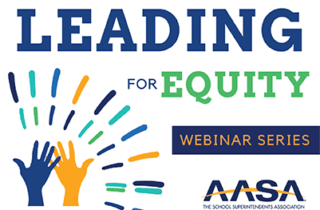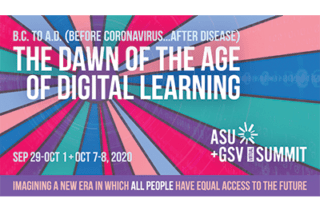Achieving educational equity doesn’t just happen when schools change their expectations and goals in the classroom. Support and understanding from all stakeholders, including families, local businesses, elected officials, etc., is essential to ensuring everyone in the community is working towards the same goal. During the edWebinar, “Leading for Equity: From Research to Practice – Accelerating Outcomes for Scholars of Color, Part II,” hosted by AASA, The Superintendents Association and AASA’s Leadership Network, the presenters continued their exploration of strategies discussed in Part I and how leaders in the Selma City Public Schools are mobilizing their community in pursuit of educational equity.
Achieving educational equity is a moral and fiscal imperative, according to Dr. Bren Elliott, Chief School Improvement and Supports Officer for District of Columbia Public Schools. Moral because all students deserve access to the same high-quality education and opportunities, and fiscal because research shows the negative economic impact when students are left behind. In the edWebinar, “Leading for Equity: From Research to Practice – Accelerating Outcomes for Scholars of Color, Part I,” hosted by AASA, The Superintendents Association and AASA’s Leadership Network, the leaders from Selma City Public Schools in Alabama shared the first part of their plan and how it ties into Dr. Elliott’s research on successful strategies for achieving educational equity.
Presented by Samantha Reichard, Lead Real Time Teacher Coach, Charlotte-Mecklenburg Schools, NC
Presented by Dr. Juli Dixon, Professor of Mathematics Education, University of Central Florida
Presented by Dr. Gene Kerns, Vice President and Chief Academic Officer, Renaissance®; and Dr. Katie McClarty, Vice President of Research and Design, Renaissance®
Presented by Dr. David Miyashiro, Superintendent, Cajon Valley Union School District, CA; Phyllis Lockett, Founder and CEO, LEAP Innovations; and Courtney Reilly, K-12 Lead, GSV Summit
Presented by Melissa Herzig, Ed.D., Director of Translation, Science of Learning Lab, and Assistant Director, Educational Neuroscience, Gallaudet University; Andrea Sonnier, Ph.D. Candidate, Department of Education, and Creator, Critical Consciousness School, Gallaudet University; and SaraBeth Sullivan, Research Intern, Learner Variability Project, and Ph.D. Candidate, Educational Neuroscience, Gallaudet University
This session will include strategies to redress the “nothing you can say will convince me otherwise” mindset among young learners and highlight programs that empower students to feel politically empowered to become change makers.
In a recent edWebinar sponsored by Kaplan Early Learning Company, “Embracing Anti-Bias Classrooms: A Response to Racism in America,” four recognized early childhood education specialists, and lead authors of the newly released book Don’t Look Away, Embracing Anti-Bias Classrooms, emphasized that to challenge bias, educators have to recognize the role implicit bias, microaggression, and white privilege hold in undermining the learning experiences of marginalized Black and brown children.
Join this edWebinar to learn about the Back to School Instructional Program Scheduling Map. The map includes multiple ideas for addressing special education compliance, staffing teams, and student schedules given health, safety, and social distancing requirements while prioritizing equity.










